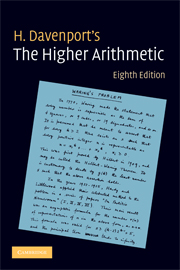V - Sums of Squares
Published online by Cambridge University Press: 05 June 2012
Summary
Numbers representable by two squares
The question as to what numbers are representable as the sum of two squares is a very old one; there are some statements bearing on it in the Arithmetic of Diophantus (about 250 a.d.), but their precise meaning is not clear. The true answer to the question was first given by the Dutch mathematician Albert Girard in 1625, and again by Fermat a little later. It is probable that Fermat had proofs of his results, but the first proofs we know of are those published by Euler in 1749.
It is an easy matter to rule out certain numbers as incapable of being represented as the sum of two squares. In the first place, the square of any even number is congruent to 0 (mod 4), and the square of any odd number is congruent to 1 (mod 4). Hence the sum of any two squares must be congruent either to 0 + 0 or 0 + 1 or 1 + 1 (mod 4), that is either to 0 or 1 or 2 (mod 4). Thus any number which is of the form 4k + 3 cannot be the sum of two squares.
But we can go further than this. If a number N has a prime factor q which is of the form 4k + 3, the equation x2 + y2 = N would imply the congruence x2 ≡ −y2 (mod q), and since −1 is a quadratic non-residue to the modulus q, this congruence holds only when x ≡ 0 and y ≡ 0 (mod q).
Information
- Type
- Chapter
- Information
- The Higher ArithmeticAn Introduction to the Theory of Numbers, pp. 103 - 115Publisher: Cambridge University PressPrint publication year: 2008
